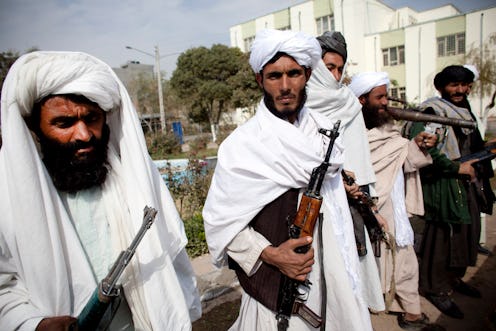News
New Taliban Leader Ordered Hit on Malala
The Taliban in Pakistan has named its new leader: Mullah Fazlullah. Fazlullah was chosen in a vote by the Taliban’s governing body, a spokesman announced Thursday. Fazlullah is seen as a hardline commander, even amongst the Taliban. His troops are the ones responsible for shooting Malala Yousafzai last year, indicating the direction in which the Pakistani Taliban wants to go. The militant is believed to be hiding in Afghan provinces on the Pakistani border, from where he orchestrates attacks within Pakistan.
In one of his first actions as leader, Fazlullah — also known as Mullah Radio for his fiery, illegal broadcasts — nixed potential peace talks with Pakistani forces. "There will be no more talks as Mullah Fazlullah is already against negotiations with the Pakistan government," Taliban spokesman Shahidullah Shahid told Reuters. "All governments play double games with us. In the name of peace talks, they deceived us and killed our people. We are one hundred percent sure that Pakistan fully supports the United States in its drone strikes." Shahid referred to Pakistan's unfortunate reality: after lengthily condemning U.S. drone strikes on Pakistani soil and denying any knowledge of them, Pakistan was faced with revelations of secret documents that showed the U.S. acted with its approval. As a cherry on top, Fazlullah might yet decide to avenge his predecessors death with a new campaign of violence on the country.
Unlike his predecessor, Hakimullah Mehsud (of whom the west had many photos) Fazlullah has done a good job hiding from the camera. In 2009, NBC obtained what was believed to be the only known photo of him. Mehsud was killed last week by a U.S. drone strike. Early reports mistakenly named Khan Said, also known as Sajna, as the new leader.
Instead, Fazlullah preferred to communicate via airwaves. His militants seized control of Pakistan’s Swat Valley after he launched an underground radio station, broadcasting Taliban ideology to local residents. Soon, the official government was ousted, and replaced with executions and public floggings. Conflict in the area came to a head when the Taliban attempted to assassinate Yousafzai, who transformed overnight into a world-wide symbol against the Taliban.
Fazlullah’s election signals more trouble for the Pakistani government, which is trying to balance its desire to rid itself of the Taliban with its desire for independence from American influence. Drone strikes carried out by U.S. forces have been successful at eliminating some top militants, but also result in many civilian causalities, which turn public opinion away from the government — and create more recruits for the militants.
